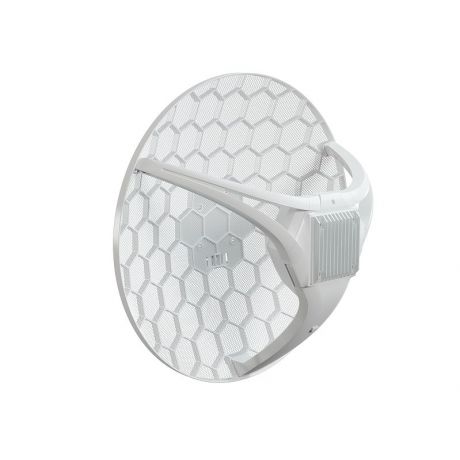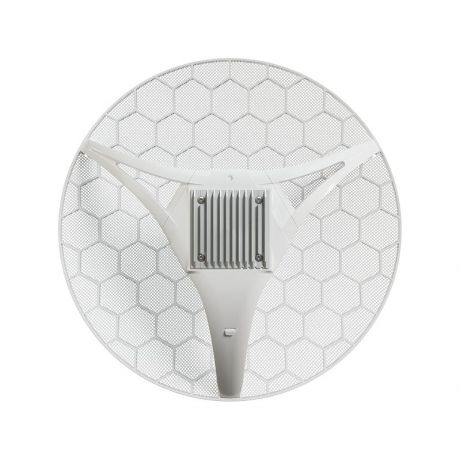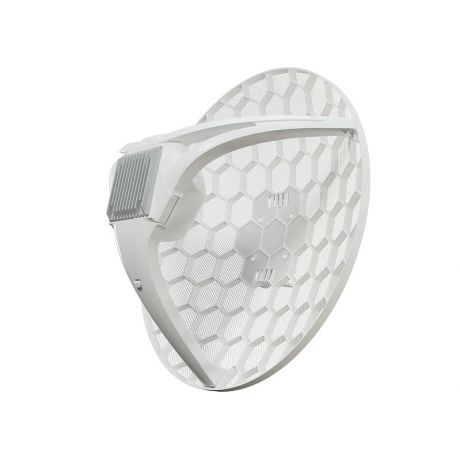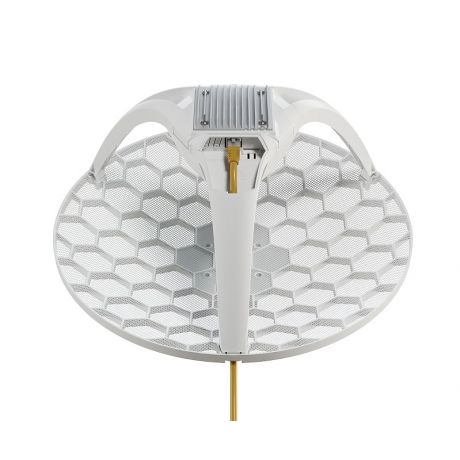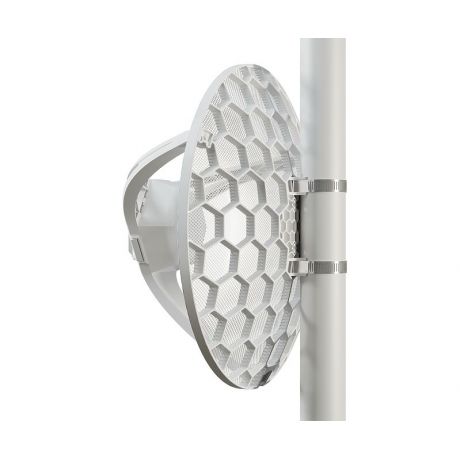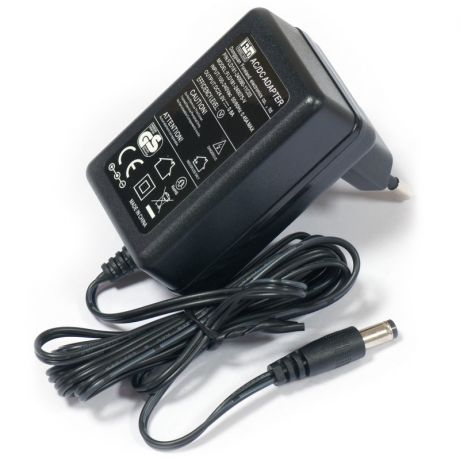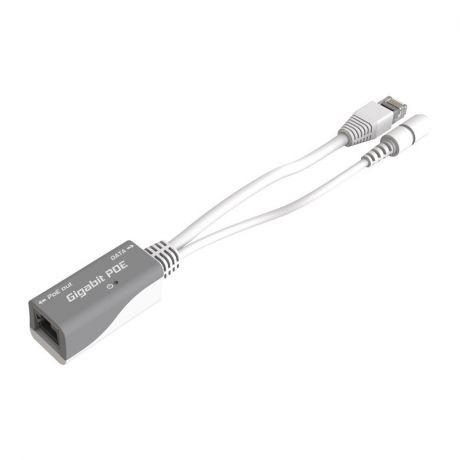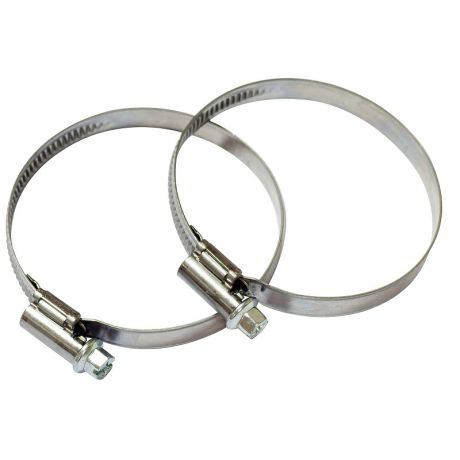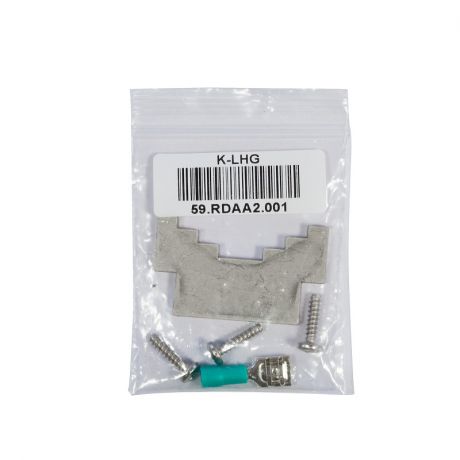Do you want high-speed Internet in the middle of nowhere? Then you want our newest LHGG LTE6 kit! It is a device for “last mile” Internet access in very remote locations. Mount it outdoors, on a pole, mast, or any tall structure, and connect even where cell phones fail. Due to its large high-gain 17 dBi antenna, the LHGG LTE6 kit can connect to cell towers in extreme rural locations, giving you the ability to provide last mile internet access where nothing else is available.
The LHGG LTE6 kit features a 300 Mbps CAT6 LTE modem, which enables carrier aggregation and allows the device to use multiple bands at the same time. That is a huge advantage when there are a lot of LTE users in the area. It provides better responsiveness in a crowded environment and higher efficiency for weaker signal situations in the countryside. We have seen Internet speed doubling in rural areas after switching to CAT6, so there is no need to wait for cable network expansions.
This device features a Gigabit Ethernet port with PoE-in for powering the device from the Ethernet port. The grid antenna design can withstand harsh, windy weather and can be mounted in different ways. There is a massive heat sink, so you don’t have to worry about overheating. With this device, you can really focus on the important stuff while the tech simply works in the background.
Specifications
| Details |
| Product code | RBLHGGR&R11e-LTE6 |
| Architecture | ARM 64bit |
| CPU | 88F3720 |
| CPU core count | 2 |
| CPU nominal frequency | 800 MHz |
| Dimensions | 391 x 391 x 237 mm |
| RouterOS license | 3 |
| Operating System | RouterOS |
| Size of RAM | 256 MB |
| Storage size | 16 MB |
| Storage type | FLASH |
| MTBF | Approximately 200'000 hours at 25C |
| Tested ambient temperature | -30°C to 70°C |
Powering
| Details |
| PoE in | 802.3af/at |
| PoE in input Voltage | 12-57 V |
| Number of DC inputs | 1 (PoE-IN) |
| Max power consumption | 8 W |
| Max power consumption without attachments | 8 W |
| FAN count | Passive |
Mobile
| Details |
| 2G Category | Class12 |
| 2G bands | 2 (1900MHz) / 3 (1800MHz) / 5 (850MHz) / 8 (900MHz) |
| 3G Category | R7 (21Mbps Downlinks, 5.76Mbps Uplink) / R8 (42.2Mbps Downlink, 5.76Mbps Uplink) |
| 3G bands | 1 (2100MHz) / 2 (1900MHz) / 5 (850MHz) / 8 (900MHz) |
| LTE Category | 6 (300Mbit/s Downlink, 50Mbit/s Uplink) |
| LTE FDD bands | 1 (2100MHz) / 2 (1900MHz) / 3 (1800MHz) / 7 (2600MHz) / 8 (900 MHz) / 20 (800MHz) / 5 (850MHz) / 12 (700MHz) / 17 (700MHz) / 25 (1900MHz) / 26 (850MHz) |
| LTE TDD bands | 38 (2600MHz) / 40 (2300MHz) / 39 (1900MHz) / 41n (2500MHz) |
Ethernet
| Details |
| 10/100/1000 Ethernet ports | 1 |
Peripherals
| Details |
| Number of SIM slots | 1 Modem (Micro SIM) |
| MiniPCI-e slots | 1 |
Other
Certification & Approvals
| Details |
| Certification | CE, EAC, ROHS |
Ethernet test results
| RBLHGGR&R11e-LTE6 | 88F3720 1G one port test |
| Mode | Configuration | 1518 byte | 512 byte | 64 byte |
| kpps | Mbps | kpps | Mbps | kpps | Mbps |
| Bridging | none (fast path) | 81.3 | 987.3 | 235.0 | 962.6 | 789.9 | 404.4 |
| Bridging | 25 bridge filter rules | 81.3 | 987.3 | 221.3 | 906.4 | 678.3 | 347.3 |
| Routing | none (fast path) | 81.3 | 987.3 | 235.0 | 962.6 | 790.4 | 404.7 |
| Routing | 25 simple queues | 81.3 | 987.3 | 235.0 | 962.6 | 450.0 | 230.4 |
| Routing | 25 ip filter rules | 81.3 | 987.3 | 219.8 | 900.3 | 219.5 | 112.4 |
- All tests are done with Xena Networks specialized test equipment (XenaBay),and done according to RFC2544 (Xena2544)
- Max throughput is determined with 30+ second attempts with 0,1% packet loss tolerance in 64, 512, 1518 byte packet sizes
- Test results show device maximum performance, and are reached using mentioned hardware and software configuration, different configurations most likely will result in lower results








































